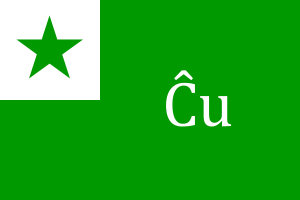Difference between revisions of "Language/Esperanto/Grammar/Interrogation"
Jump to navigation
Jump to search
(New words) Tags: Mobile edit Mobile web edit |
|||
| Line 1: | Line 1: | ||
[[File:Esperanto interrogation.png|thumb]] | [[File:Esperanto interrogation.png|thumb]] | ||
In Esperanto, when you want to ask a question, you only need to add a "ĉu" at the beginning of the sentence. | In Esperanto, when you want to ask a 'yes or no' question, you only need to add a "ĉu" at the beginning of the sentence. | ||
*You have a car. - Vi havas aŭton. | *You have a car. - Vi havas aŭton. | ||
| Line 9: | Line 9: | ||
*Do I have to work now? - Ĉu mi devas labori nun? | *Do I have to work now? - Ĉu mi devas labori nun? | ||
Other questions start with: | |||
* Who ate my eggs? - Kiu manğis miaj ovojn? | |||
* Which (one) is my egg? - Kiu estas mia ovo? | |||
* How many cars do you have? - Kiom da aŭton vi havas? | |||
* Where do you live? - Kie vi logas? | |||
* What is beautiful? - Kio estas bela? | |||
* When did you eat my eggs?- Kiam vi manğis miajn ovojn? | |||
* Why did you eat my eggs? - Kial vi manğis miajn ovojn? | |||
Revision as of 21:29, 27 December 2017
In Esperanto, when you want to ask a 'yes or no' question, you only need to add a "ĉu" at the beginning of the sentence.
- You have a car. - Vi havas aŭton.
- Do you have a car? - Ĉu vi havas aŭton?
- I have to work now. - Mi devas labori nun.
- Do I have to work now? - Ĉu mi devas labori nun?
Other questions start with:
- Who ate my eggs? - Kiu manğis miaj ovojn?
- Which (one) is my egg? - Kiu estas mia ovo?
- How many cars do you have? - Kiom da aŭton vi havas?
- Where do you live? - Kie vi logas?
- What is beautiful? - Kio estas bela?
- When did you eat my eggs?- Kiam vi manğis miajn ovojn?
- Why did you eat my eggs? - Kial vi manğis miajn ovojn?
